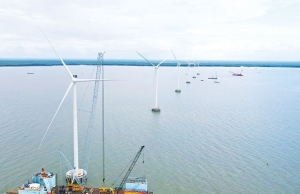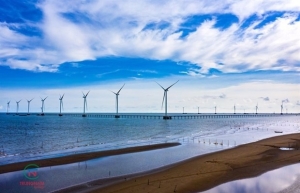Potential of acquisition of offshore wind technology in Vietnam
Offshore wind: Best renewable energy source for Vietnam
 |
| Henri Wasnick, Renewable energy advisor for GIZ Energy’s Support Programmme |
Vietnam has a long coastline with the utmost feasibility to install offshore wind power projects. As per the World Bank’s Offshore Wind Roadmap for Vietnam, the country has the potential to meet 12 per cent of its total electricity demand by 2035.
However, to continue sustaining this growth in renewables, improvements are needed in terms of energy system expansion planning and regulatory frameworks for procurement to ensure an affordable renewable energy supply.
Offshore wind projects are increasing globally and the World Bank indicates eight new potential markets. Right now, there are about 10 experienced international companies that are able to develop offshore wind projects, which leads to serious competition among countries that want to go for offshore wind.
These companies tend to allocate their resources to countries which have a legal framework in place first. Over and above that, the steel price is also increasing. Therefore, for Vietnam, it is now more important than ever to develop a legal framework so developers can dive deeper into the planning and allocate their resources within the country.
The proposed PDP8 draft focuses on renewable energy
As per the latest National Power Development Plan (PDP8) draft, Vietnam aims to forego building any new coal-fired power projects after 2030. This will reduce the dependence on coal to 9.5 per cent by 2045 compared to 15-19 per cent.
Vietnam is also planning for a 50 per cent share of wind and solar power by 2045 compared to the previous target of around 40 per cent. The current draft shows 7GW of offshore wind until 2030. This rapid expansion has opened many opportunities for investors, however, there are still certain areas that need to be improved to attract their interest.
Challenges along the way
Applying for an offshore survey license for wind power projects still presents many obstacles as the ability to upgrade the national power grid system, legal frameworks, and technical standards for the licensing of surveys is almost non-existent.
In addition, regulations on bidding mechanisms and investor selection for power source projects have not been completed yet and power purchase agreements (PPA) still lack the ability to borrow international capital.
| To continue sustaining growth in renewables, improvements are needed in terms of energy system expansion planning and regulatory frameworks for procurement to ensure an affordable renewable energy supply. |
Along with this, the interference and overlapping related to survey privileges need to be clarified. As per the current draft decrement No.11/2021/ND-CP, it is possible to allow many project developers to conduct surveys on a non-exclusive sea area.
However, when looking globally, most governments only allow one investor to conduct offshore survey activities in a certain area for a specific period. This approach ensures serious, long-term commitments from capable project investors.
In the current draft of decree No.11/2021/ND-CP, it is mentioned that the developers should share their survey results with the authorities. As such surveys are large-scale investments, there are calls for compliant regulations for exclusivity for a certain time and international-standard regulations to ensure data security for survey documentation during the project development process.
Vietnam is one of many countries that want to attract resources and investments in offshore wind. In this global competition for this technology and investment, it is critical to recognise that the developing companies and investors who have access to these resources will only make serious investment decisions and allocate resources in Vietnam if appropriate frameworks are in place.
In addition, rating criteria for projects and project developers to achieve survey rights and project licenses need to be transparently developed and correspond with international standards. The same goes for approval processes, which need to be developed.
Approval of all these regulations will make sure that Vietnam can lead the completion of legal framework development and consequently allow investors to take serious action in the direction of supporting Vietnam to achieve its energy mix target.
Policy recommendations
To achieve the goals of the PDP8 and National Energy Master Plan for 2021-2030, specifically related to offshore wind, a relevant legal framework needs to be in place within the next year to have 7GW of offshore wind by 2030.
Along with this, a detailed implementation plan must be developed based on the World Bank’s Offshore Wind Roadmap for Vietnam.
Pricing mechanisms need to be developed to enable investors to make decisions. An investment for 600MW of offshore wind will typically need cooperation from more than 20 international banks. Without a suitable PPA that complies with international standards, it will be hard to fulfil due diligence criteria.
Moving forward, the limited grid capacity of the country needs upgrading as it currently stifles the renewable energy sector. Electricity of Vietnam currently maintains a monopoly over electricity transmission but this could be opened up to private investors to enable further development.
Both investors and the government are being asked to come up with reasonable strategies to ensure that the wind energy industry does not enter boom-bust cycles.
Finally, both the government and the private sector need proper education and training to fully understand offshore wind power.
 | Survey overlap potential irks wind power developers Due to several legal pitfalls, conflicts may occur among wind power investors, both onshore and off, as they take part in surveying activities for their potential projects. |
 | Offshore wind power investors need better mechanism While Vietnam plans a 7,000MW of offshore wind power by 2030, most of wind farm investors shared their concern about the bidding mechanism for the industry in a recent energy workshop in Hanoi. |
What the stars mean:
★ Poor ★ ★ Promising ★★★ Good ★★★★ Very good ★★★★★ Exceptional
Related Contents
Latest News
More News
- Trung Nam-Sideros River consortium wins bid for LNG venture (January 30, 2026 | 11:16)
- Vietnam moves towards market-based fuel management with E10 rollout (January 30, 2026 | 11:10)
- Envision Energy, REE Group partner on 128MW wind projects (January 30, 2026 | 10:58)
- Vingroup consults on carbon credits for electric vehicle charging network (January 28, 2026 | 11:04)
- Bac Ai Pumped Storage Hydropower Plant to enter peak construction phase (January 27, 2026 | 08:00)
- ASEAN could scale up sustainable aviation fuel by 2050 (January 24, 2026 | 10:19)
- 64,000 hectares of sea allocated for offshore wind surveys (January 22, 2026 | 20:23)
- EVN secures financing for Quang Trach II LNG power plant (January 17, 2026 | 15:55)
- PC1 teams up with DENZAI on regional wind projects (January 16, 2026 | 21:18)
- Innovation and ESG practices drive green transition in the digital era (January 16, 2026 | 16:51)

 Tag:
Tag:

























 Mobile Version
Mobile Version